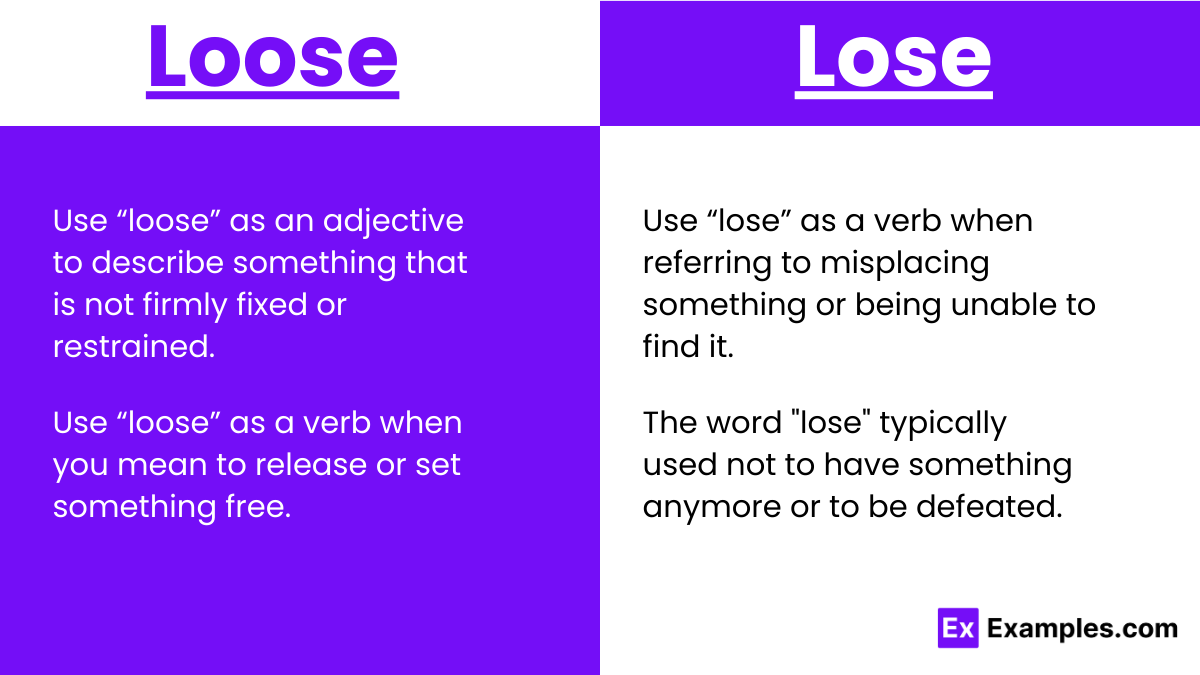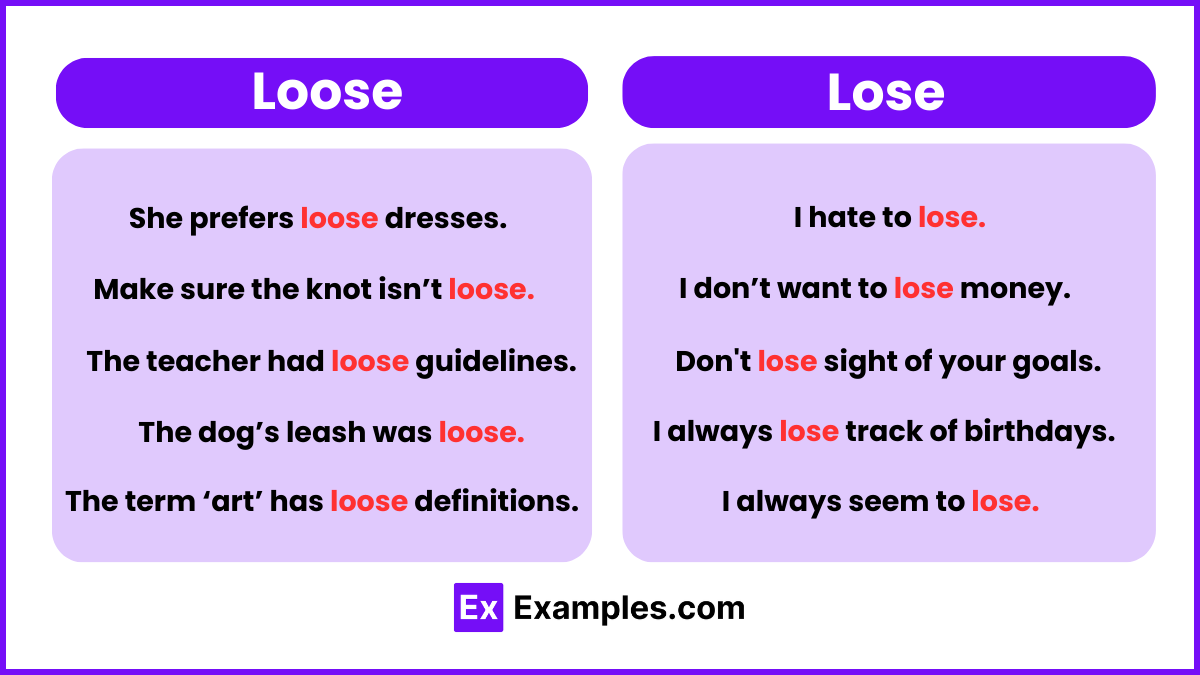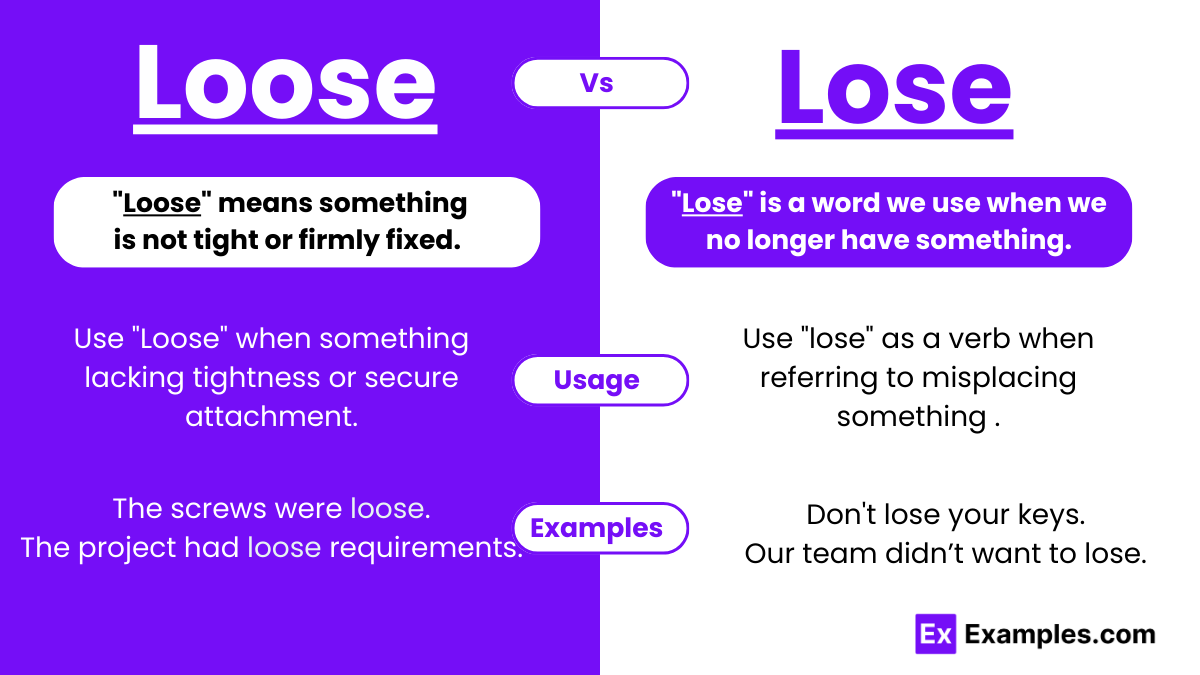Loose vs Lose
Mixing up ‘loose‘ and ‘lose‘ is a common mistake, but they’re actually quite different. ‘Loose‘ means something is not tight or firmly fixed, like loose clothing. On the other hand, ‘lose‘ means to no longer have something or to fail to win. Let’s break down these differences to help you use ‘loose’ and ‘lose’ correctly in your writing.
Loose and Lose – Meanings
- “Loose” is a word we use to talk about things that are not held tightly or firmly. It can describe clothes that are not tight, knots that come undone, or rules that aren’t strict. As an adjective, “loose” can be used attributively (before a noun) or predicatively (after a linking verb).
- “Lose” is a word we use when we no longer have something, like when we can’t find our keys or when we don’t win a game. As a verb, “lose” can be conjugated in various tenses and forms depending on the context.
Summary
“Loose” and “Lose” may sound alike, but they have very different meanings. Picture a balloon: if it’s loose, it’s not tied tightly. That’s ‘loose’ – it means something isn’t held firmly. Now, think about a balloon floating away: you ‘lose’ sight of it. ‘Lose’ is about not having something anymore. So, ‘loose’ describes things that aren’t tight, while ‘lose’ is about no longer having something.
How to Pronounce Loose and Lose
- Loose: Pronounced as /luːs/. It rhymes with “moose.” The “oo” sound is a long “oo” sound, similar to the one in “goose.”
- Lose: Pronounced as /luːz/. It also rhymes with “moose.” The “oo” sound is again a long “oo” sound, similar to the one in “goose,” and it ends with a “z” sound.
Loose vs Lose: What’s the difference?
| Attribute | Loose | Lose |
|---|---|---|
| Part of Speech | Adjective, Verb | Verb |
| Meaning | – Not firmly fixed or fastened in place | – To suffer loss, misplace, or fail to win |
| Example | – The shirt is too loose for me. | – Don’t lose your keys again. |
| Synonyms | – Baggy, slack, lax | – Misplace, forfeit, suffer defeat |
| Antonyms | – Tight, secure, firm | – Win, find, keep |
| Usage | – Describing something not tightly held | – Describing failure or misplacement |
Loose vs Lose – How to Remember Which is Correct?
Think of the double “o” in “loose” resembling the shape of something not tightly bound. Remember “lose” with just one “o” because losing something reduces the number of “o’s” you have. So, the shortcut is:
- “Loose” has two “o’s” like something that is not tightly held.
- “Lose” has one “o,” reminding you of losing one thing.
How to use Loose and Lose

Loose Usage:
- As an Adjective:
- Use “loose” as an adjective to describe something that is not firmly fixed or restrained:
- “The rope was loose and swung freely in the wind.”
- “His shirt was loose, hanging off his shoulders.”
- “The dog’s collar was loose, and it slipped off easily.”
- Use “loose” as an adjective to describe something that is not firmly fixed or restrained:
- As a Verb:
- Use “loose” as a verb when you mean to release or set something free:
- “She loosed her grip on the handlebars and fell.”
- “The hunter loosed an arrow at the target.”
- “The captives were loosed from their chains.”
- Use “loose” as a verb when you mean to release or set something free:
Lose Usage:
- As a Verb:
- Use “lose” as a verb when referring to misplacing something or being unable to find it:
- “I always seem to lose my keys when I’m in a rush.”
- “He doesn’t want to lose his wallet in the crowd.”
- “Try not to lose your train ticket before we board.”
- Use “lose” as a verb when referring to misplacing something or being unable to find it:
Where to Use Loose and Lose
Loose
- Interpretations or Definitions: “The term ‘art’ has loose definitions.”
- Clothing: “She prefers loose dresses.”
- Hair: “Her loose curls bounced.”
- Knots or Ties: “Make sure the knot isn’t loose.”
- Parts or Components: “The loose screw wobbled.”
- Language or Rules: “The teacher had loose guidelines.”
- Change or Variation: “The project had loose requirements.”
- Boundaries or Constraints: “The company had loose regulations.”
- Control or Grip: “The dog’s leash was loose.”
- Lips or Speech: “He let loose a string of curses.”
Lose
- Misplacing Items: “I always lose my keys.”
- Sports and Competitions: “Our team didn’t want to lose.”
- Weight Loss: “She’s determined to lose weight.”
- Gambling: “I don’t want to lose money.”
- Forgetting Information: “I always lose track of birthdays.”
- Responsibilities or Opportunities: “Don’t lose sight of your goals.”
- Physical Competitions: “I hate to lose.”
- Card Games or Board Games: “I always seem to lose.”
- Employment: “He was afraid he would lose his job.”
- Attention or Interest: “The presentation caused me to lose interest.”
Examples

Examples of Loose
- Infinitive: They need to loose the knots in the rope.
- Present tense: He usually looses the dogs in the park.
- Past tense: She loosed the arrow and hit the target.
- Present participle: They are loosing the grip on the situation.
- Past participle: The captive was loosed from his chains.
Examples of Lose
- Infinitive: She doesn’t want to lose the race.
- Present tense: He loses his keys often.
- Past tense: They lost the game yesterday.
- Present participle: I am losing weight by exercising regularly.
- Past participle: The lost wallet was found under the couch.
Synonyms of Loose and Lose
| Loose | Lose |
|---|---|
| Unfastened | Misplace |
| Unattached | Mislay |
| Slack | Fail |
| Lax | Be deprived of |
| Unsecured | Be defeated in |
Exercise
Fill in the blank with the correct form of Loose or Lose
- The knot is ___________.
- I can’t find my keys; I must have ___________ them.
- Her grip on the rope is ___________.
- The dog is running ___________ in the park.
- He tends to ___________ his temper easily.
- His shoes are too ___________ for him.
Answers
- loose
- lose
- loose
- loose
- lose
- loose
FAQ’S
Which is Correct Lose or Loose?
“Lose” is correct when referring to misplacing something or experiencing defeat. “Loose” means not tight. Example: “I don’t want to lose my keys.”
Is it let Him Loose or Lose?
Correct phrase is “Let him loose” when releasing something or someone. “Lose” refers to misplacing. Example: “Please let him loose in the garden.”
Is it Loosing or Losing Weight?
Correct term is “losing weight.” “Loosing” is not standard usage. Example: “She’s been losing weight steadily.”
Is Loosing or Losing Correct?
“Losing” is correct. “Loosing” isn’t standard usage. Example: “You’re losing your keys again.”
Do You Loose or Lose Someone?
You “lose” someone, meaning to be separated from them. “Loose” means not tight. Example: “I don’t want to lose my best friend.”



